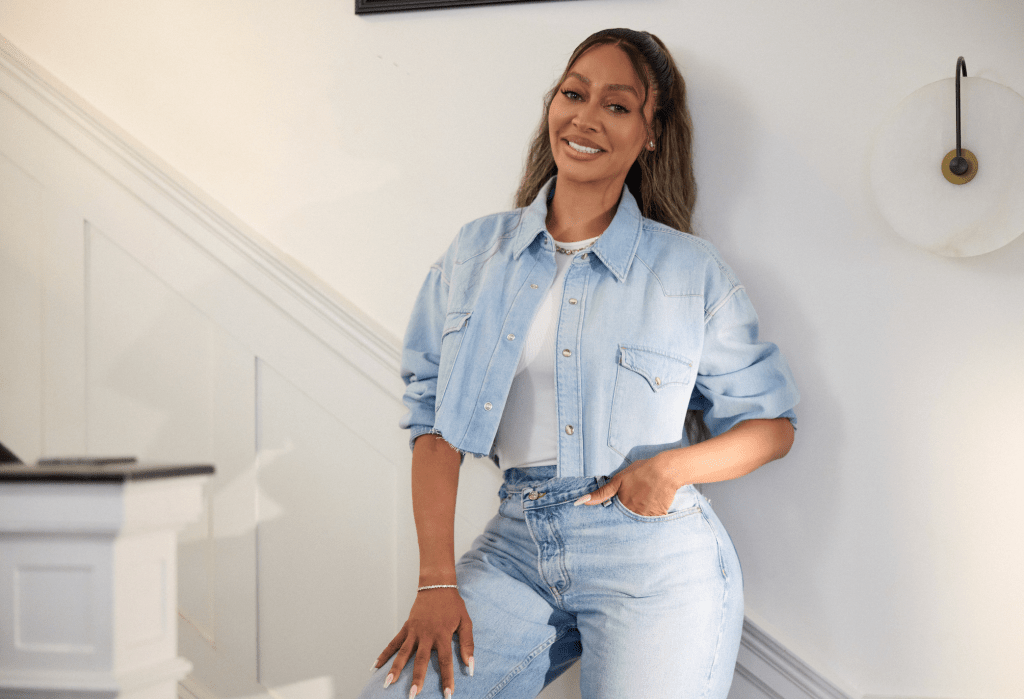-
 play_arrow
play_arrow
Foxy 106.9
-
 play_arrow
play_arrow
Dr. Candice Carter-Oliver Interview
Exclusive: La La Anthony Shares The Health Condition That Has Plagued Her Life Over The Last 10 Years

Source: Amgen / Amgen
On October 1, La La Anthony revealed to her 15 million followers that she has been battling with plaque psoriasis. “I’m going to be real with you; there were many times when my plaque psoriasis influenced what I wore or how I did my hair and makeup,” she wrote in the lengthy Instagram post.
“I have psoriasis for 30 years now and I still can’t figure it out just be happy that help a lot ,” one fan responded. With that, the actress sparked a much-needed conversation about the skin condition that affects approximately 8 million people in the US, and 125 million people worldwide, according to WedMD.
Learning that thee La La Anthony, a woman who’s sex appeal radiates from the depths of her being to the ends of the earth, has plaque psoriasis intrigued me. The skin condition doesn’t look like it wavered her confidence. In fact, from the outside looking in, it seems like the actress has gained a deeper sense of self as she’s grown older. So when I was invited to have a sit down with the BMF actress and board-certified dermatologist Meagen McCusker M.D., M.S., FAAD to learn more about the condition, I jumped at the opportunity.
La La Anthony shares her journey with plaque psoriasis
I had limited knowledge of plaque psoriasis besides the repetitive commercials that would air during my Lifetime TV binge sessions. I also recall Kim Kardashian mentioning that she had it during a Keeping Up With The Kardashians episode. I knew it was a skin condition but assumed it was similar to eczema, and honestly, it was none of my concern. With limited knowledge, I dismissed it as one of the many conditions out there plaguing the world—not me. Ignorance is bliss, ain’t it?
“When I learned that I had (plaque psoriasis), it was like, ‘Well, what is this?’ I didn’t know what it was. I got these itchy patches,” Anthony tells me. “I went to the dermatologist and found out it’s an autoimmune disease that starts inside the body, I was like, okay, I get it now. And I think it’s just about finding the treatment options that work for you.”
“Plaque psoriasis can affect anybody at any age,” Dr. McCusker explains. “You can get it when you’re younger, around your twenties. And then again, people can present with it later on, in their sixties.”
“When people get it early on, it’s probably triggered by infection. So when babies or young adults get it, it could be something like strep throat that triggers the body to start to overreact. As you get older, it’s probably less infection. It’s more related to an unhealthy lifestyle that drives inflammation in the skin. Things like smoking, alcohol, obesity, and stress are all very pro-inflammatory conditions that will drive people who have a genetic predisposition to develop it. Not everyone will develop it when they get exposed to these things, but there’s a genetic predisposition because it runs in families,” she continues.
Source: Amgen / Amgen
La La has been dealing with plaque psoriasis for the last 10 years. And while she says it influenced what she wore or how she did her makeup, she felt the condition impacted her hair the most. “I get it in my scalp really bad. That’s where it goes a little crazy—on my scalp when I’m washing my hair. And then, five minutes later, you wouldn’t even think that I washed my hair. I would go to the dermatologists, who would give me stuff and say, ‘Use this, wash your hair, but you have to wash your hair once or twice a day.’”
Not a feasible solution for a Black woman who rocks protective styles like the rest of us.
So, what is the solution?
Source: Courtesy of Amgen / Amgen
Dr. McCusker emphasized the importance of a healthy diet, lifestyle, and low stress levels. “Stress is a really big trigger. But an unhealthy lifestyle can definitely drive it, too. Smokers tend to have the worst cases, and alcoholism can make it harder for patients to get it under control. Obesity, too.”
“From a diet perspective, I’m a big proponent of the Mediterranean diet. Certainly, we know that anything anti-inflammatory in the body will result in less inflammation overall. Reduce high sugars, which are driving your insulin. Eat clean foods high in essential fats, like salmon, nuts, and seeds. If people can—(they should) eat a little bit more cleanly, stay away from high fructose corn syrup, and live a healthy lifestyle of not smoking, not drinking alcohol, and getting active,” she suggests.
La La saw the most improvement with a raw vegan diet but says it was difficult to maintain because of her unpredictable lifestyle. “A raw vegan diet was a game changer. But that’s just not realistic. It’s a huge commitment. I was like, ‘This is so great, but can I do this when I get home?’ There would be so much food as soon as I’d get to New York. Shout out to anybody who could do that,” she says.
Ultimately, a big part of the solution is initiating the conversation. “It’s just about finding what works, which is why I wanted to partner with Amgen and get my story out there. We did a cool interactive video on ‘MomentswithLala.com and talked about what works for me, different things people can try, and questions people have.” La La says. “Why not talk about it? What is there to be ashamed of?”
The partnership allows her to tell her story and remove the stigma from the skin condition that can chip away at people’s feelings about how they look. “It shouldn’t affect your confidence. There’s nothing wrong with you. You’re perfectly normal,” she says.
DON’T MISS…
Tabitha Brown Is Removing The Stigma Against Bladder Leaks
La La Anthony: Mogul In The Making
The post Exclusive: La La Anthony Shares The Health Condition That Has Plagued Her Life Over The Last 10 Years appeared first on HelloBeautiful – Fashion, Beauty, Lifestyle and Hair Care for Black Women.
The post Exclusive: La La Anthony Shares The Health Condition That Has Plagued Her Life Over The Last 10 Years appeared first on Black America Web.

-
4942 Delmar Blvd.
St. Louis, MO. 63108
CONTACT US
- 314-782-FOXY (3699) OFC
- 314-944-1069 REQUEST LINE
- [email protected]
- ADVERTISING INQUIRIES
- [email protected]
FOXY QR CODE


